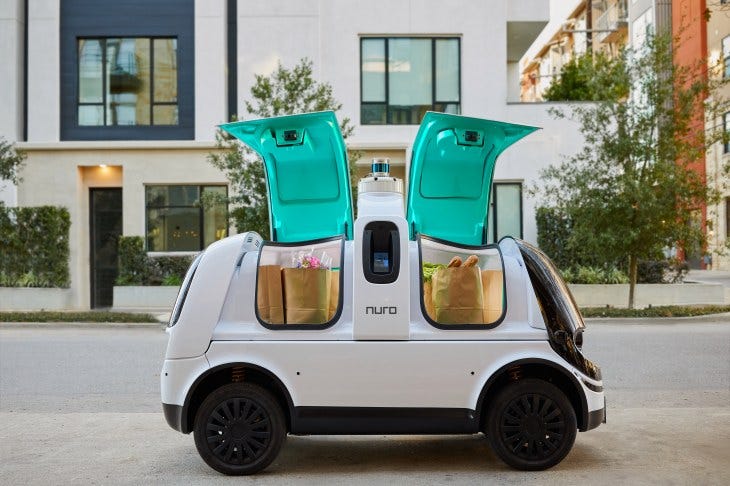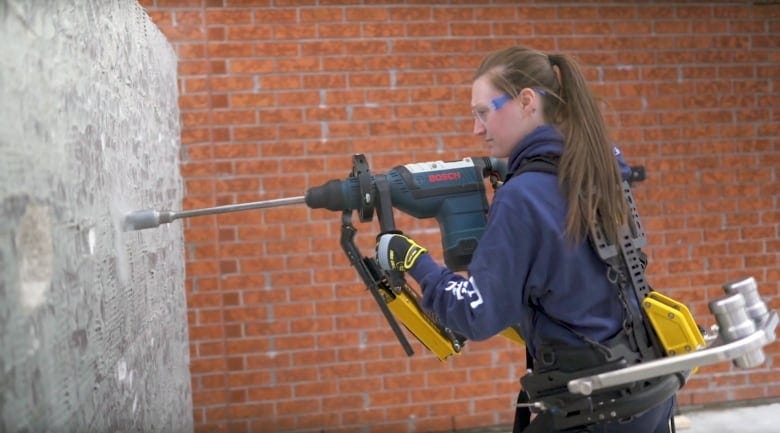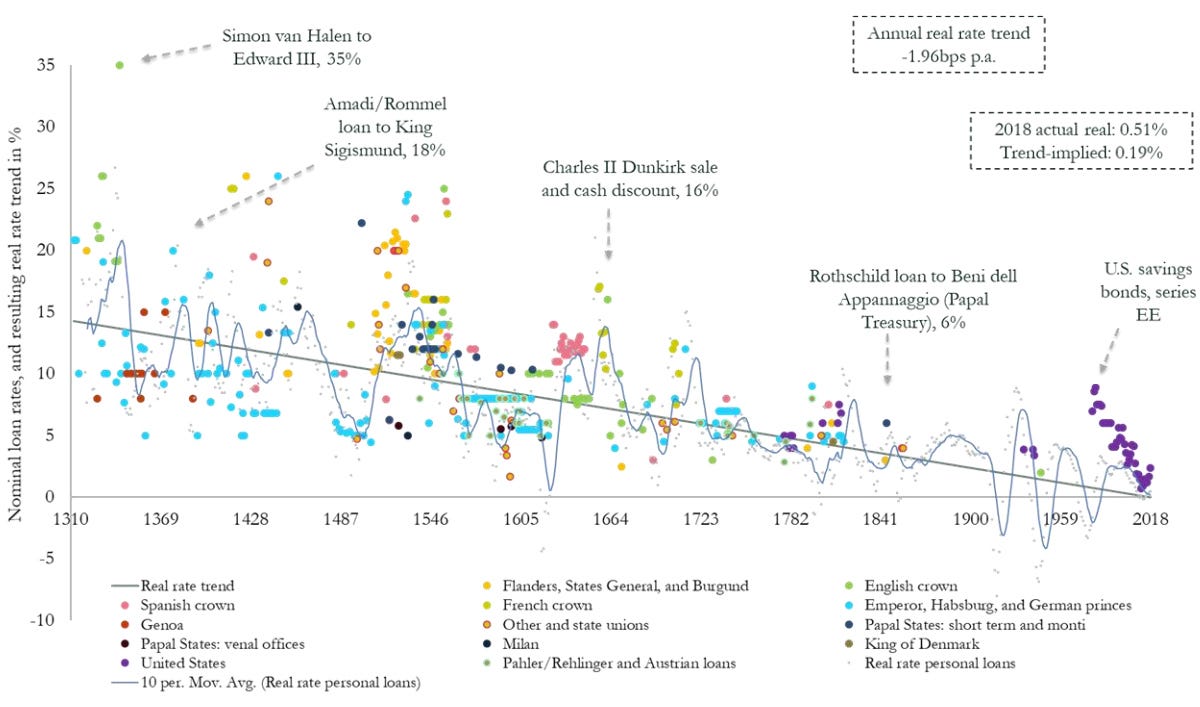Here’s your weekly wrap of technology, innovation, and finance news.
Mobility
Houston residents will soon be able to get their groceries via autonomous van afterNuro, an autonomous delivery startup, became the first company to receive a driverless exemption from the federal government. Their van, the R2, travels at a maximum speed of 40km/h and has no steering wheel or pedals. Nuro received $940 million in funding from the SoftBank Vision Fund last year.
Health
A new implant for blind people could provide rudimentary vision by jacking directly into the brain, bypassing the eye and optical nerves.
Bloomberg produced a video on Luxturna, which became the first FDA-approved gene replacement therapy in December 2017. Luxturna treats patients with faulty RPE65 genes, which leads to blindness, and works by introducing a normal copy of that gene directly to the retinal cells.
A recent trial has found it’s safe to inject people with genetically-edited immune cells in an attempt to fight cancer. The trial didn’t test efficacy.
“Before we did this, no one had ever infused Crispr-edited cells into patients, and we’re encouraged by the fact that we could do it safely,” says Edward A. Stadtmauer, an oncologist at the University of Pennsylvania and the study’s principal investigator. “Now we can move on to a whole new frontier of further engineering these cells and expanding the number of patients treated.”
Scientists have revealed the most extensive genetic map of cancers ever made.
Insights are all very well, but what about cold, hard clinical progress? Turning genome sequences into meaningful predictors of cancer will require comparisons between samples from tens of thousands of patients, say the researchers, along with data on their treatments and survival rates. Processing this would be beyond the reach of any single organisation. Instead, a follow-up project is planned that includes national funding agencies, charities and corporate partners from more than a dozen countries around the world. It aims to link full sequences of 200,000 cancer patients to their clinical data by 2025.
Robotics
The first human clinical trials of a blood-drawing robot found that it performed as well or better than human clinicians with an overall success rate of 87%. For the people whose veins were easy to access, the success rate was 97%.
Virtual and Augmented Reality
Bosch smartglasses, mentioned in Innovation Wrap #20, use a tiny laser array to paint images directly on your retina. It works quite well, and the concept video is an accurate representation of how the glasses look when using them.
Rather than projecting an image onto the lenses of the glasses themselves, the Bosch “Light Drive” uses a tiny microelectromechanical mirror array to direct a trio of lasers (red, green, and blue) across a transparent holographic element embedded in the right lens, which then reflects the light into your right eye and paints an image directly onto your retina. For this to work, the lasers have to pass cleanly through your pupil, which means that the frame and lenses have to be carefully fitted to the geometry of your face (frames with prescription lenses work fine).
I just learnt that you can use virtual reality underwater and it’s apparently amazing.
It was the closest I’ve felt to floating in another world.
A mother met her deceased daughter in VR. Her 7-year-old daughter, who died of leukemia in 2017, was recently recreated in VR as part of a Korean project designed to relieve the mother’s grief. I find this both sad and unsettling. The video of the meeting is here, and you can find a translation in the comments.
Gaming
Dan Houser, the creative force behind Grand Theft Auto and Red Dead Redemption 2, is leaving Rockstar Games. Shares in Rockstar’s parent company, Take-Two Interactive, was down 6% on Wednesday on the announcement.
In the UK, 48% of girls aged 5 to 15 now play games online, up from 39% in 2018. 71% of boys aged 5 to 15 play games online, unchanged from 2018.
The Disinformation Age
The Atlantic discusses The Billion-Dollar Disinformation Campaign to Reelect the President. Interesting read.
I was surprised by the effect it had on me. I’d assumed that my skepticism and media literacy would inoculate me against such distortions. But I soon found myself reflexively questioning every headline.
Surveillance and Privacy
A New York school is adopting facial recognition technology in the hopes of improving safety. The technology scans faces looking for people that match a particular list and will also scan for guns. Opponents of the new technology are concerned about privacy, accuracy, and racial bias.
That list includes sex offenders in the area, people prohibited from seeing students by restraining orders, former employees who are barred from visiting the schools and others deemed “credible threats” by law enforcement.
Augmented Humans
A handful of Canadian construction companies are now using exoskeletons.
Rennehan said it could take a team of three people up to four days to chip away tiles in a washroom at a retail store. With the help of exosuits, two people can do the same work in two days “with 90 per cent less fatigue.”
Space
SpaceX is likely to spin out its Starlink satellite internet business in an IPO according to Gwynne Shotwell, the company’s president.
Starlink is the largest constellation of commercial satellites. It currently contains some 240 satellites in low-Earth orbit, most of which are orbiting 340 miles (550 km) above our heads. Thousands more satellites are expected to be added to the network in the coming years.
SpaceX founder Elon Musk says the satellites eventually will provide broadband connectivity around the world; the US Air Force already is piloting the technology to connect with its fighter jets.
A Russian satellite seems to be stalking a US spy satellite.
Wireless
The UK’s decision to allow Huawei to build part of its 5G network, despite US concerns, has prompted US attorney-general William Barr to suggest that the US take controlling stakes in Ericsson and Nokia to help build a stronger international competitor. Ericsson and Nokia shares were up 10% and 11% over the week respectively.
Finance
Visual Capitalist visualises 700 years of falling interest rates.
Activist hedge fund Elliott Management has built a $2.5 billion stake in SoftBank Group and is pushing for change.
SoftBank Vision Fund 2 could come in at less than half its planned $108 billion size.
Other Snippets
Nike’s performance shoes illustrate the leading role technology and data play in creating athletic footwear today.
Snowflake, a cloud software vendor focused on storing and analysing data, is now valued at $12.4 billion after a recent investment by Salesforces’s venture capital arm and Dragoneer Investment Group. The company generated over $100 million in revenue last year and is currently one of the fastest-growing tools being adopted by businesses.
Personal Plug: We sent out the December Quarter Update for the Perpetual Global Innovation Share Fund last week, which mainly talks about stocks I think are interesting. The fund is open to Australian investors.










